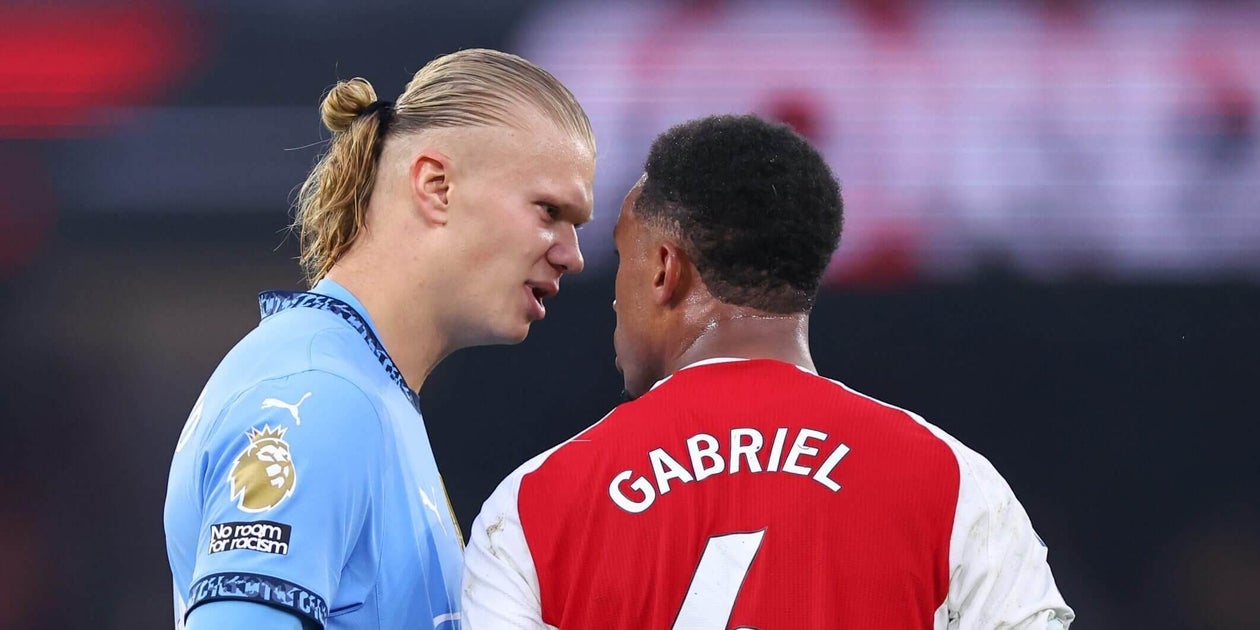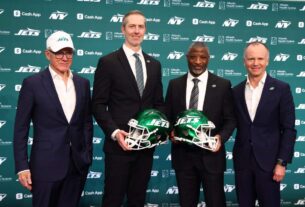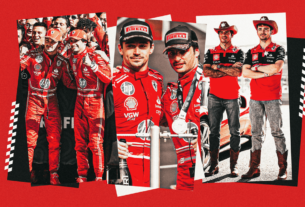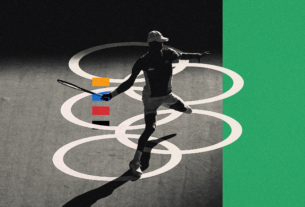Oleksandr Zinchenko had failed to read the room. Last summer, on vacation in the south of France, the Arsenal left-back had nowhere to run. Not in a metaphorical sense: he needed to find a pitch to maintain his fitness for a couple of hours a day before returning to Premier League duty.
Fortunately, he thought, he had an old friend who might be able to help. Zinchenko noticed on Instagram that Bernardo Silva, his former team-mate at Manchester City, was holidaying on the Riviera, too. Silva had spent a couple of seasons at Monaco. Assuming he would be able to point him in the direction of a place to train, Zinchenko dropped him a message.
The exchange, as Zinchenko relays in his autobiography, Believe, was good-natured. “For what?” Bernardo wrote back. “You’re going to try to win the Premier League again? Forget about it. Stay at home.” Zinchenko plays the incident for laughs. It is, though, indicative of the rivalry that has emerged between their respective teams that Bernardo does not appear to have helped.
The easiest historical parallel for the relationship between Manchester City and Arsenal — the one that has animated the last two Premier League seasons, and the one that will flicker again at the Emirates on Sunday — is perhaps the feud between Liverpool and Chelsea that burst into life two decades ago.
The two conflicts are similar in essence: old money against new, aristocracy against the arrivistes, establishment against the insurgent; the hostility is rooted not just in a mutual quest for honours but a fundamental disagreement about who has the right to regard themselves as part of the elite.
In texture, though, they are different. There was, of course, mutual antipathy between Jose Mourinho and Rafa Benitez, the managers of Chelsea and Liverpool at the height of their antagonism. At times, relations were frosty between their players, too: on England duty, Steven Gerrard and Jamie Carragher formed a separate faction to John Terry, Frank Lampard and Ashley Cole.

It was fractious between Arsenal and City in April 2023 (Michael Regan/Getty Images)
For the most part, though, it only manifested in outbursts of press conference sniping and the occasional sabotage of England’s forlorn attempts to win an international tournament. In that sense, the more apposite forerunner of Arsenal’s current conflict with Manchester City is the one that Arsene Wenger and his team enjoyed with Manchester United at the very start of this century.
There was, in that case, no simmering undercurrent: both Arsenal and United regard themselves, and would begrudgingly regard each other, as members of English football’s traditional triumvirate of powers.
The timbre of the feud, though, was the same. Their meetings were bad-tempered, fraught, freighted both with meaning and rancour. Relations not just between the clubs but the teams themselves were bitter, toxic. And, above all, things were petty. They traded barbs in public. They bristled in the tunnel, squabbled on the pitch, and threw pizza outside the dressing rooms. They shared, for a while, a mutual loathing too potent for anyone involved to conceal.

GO DEEPER
Manchester United, Arsenal and the ‘Battle of the Buffet’ – told by those who were there
More than 20 years later, the echoes are clear. Until relatively recently, it would have been possible to feel that Arsenal were doing an awful lot of the heavy lifting in terms of willing a rivalry with City into existence.
Pep Guardiola’s team had, naturally, come to play the role of a final boss in the thinking of Mikel Arteta and his players: City were, after all, the team they would have to overhaul if they were to win a first Premier League title since the height of their discord with Manchester United. City were the yardstick by which Arsenal judged themselves.
When Arsenal were beaten 3-1 by City at the Emirates in February 2023, Arteta used it as a learning moment, proof that there were certain errors his team could not afford to make “at this level”. A few months later, when City beat Arsenal 4-1 at the Etihad, he urged his players to be “humble” enough to accept the better team had won.
It was no wonder, then, that Arsenal treated their victory on penalties in the Community Shield that summer as a significant milestone. Aaron Ramsdale described it as “a statement, a marker. That mental block is gone,” he said. “We’re ready to push on now.”
Beating Guardiola’s team in the league in October 2023, Arsenal’s first win against City in the Premier League for eight years, felt even more important. “Everyone knows how hard it is to play against them,” said Gabriel Jesus, channelling his inner Independence Day-era Randy Quaid. “But it is not impossible to beat them.”
Just as significant, though, was the aftermath of that game. As the players left the field after Arsenal’s 1-0 win, the club’s set-piece coach Nicolas Jover, a former City employee, attempted to shake hands with Kyle Walker. Walker took exception, reportedly because he remembered that Jover had refused to shake hands with City’s players after Arsenal’s defeats earlier in the year. Erling Haaland became involved, too, prompting a mildly unseemly fracas. The rivalry, it turned out, did not only run one way. City might have got inside Arsenal’s heads. But Arsenal were in City’s, too.

Tempers frayed in October 2023 (Adrian Dennis/AFP/Getty Images)
In the year that followed, that became increasingly clear. Ordinarily, even those enmities that fans feel most keenly are not reflected between the executives of the clubs involved. Arsenal and Tottenham often find themselves allied in Premier League meetings. Relations between John Henry and Joel Glazer, principal owners of Liverpool and Manchester United, are not just cordial but positively friendly.
Arsenal have discovered, though, that rivalry with Manchester City is not so easily limited to the field; there is, instead, an element of total war. Relations between the two clubs have been strained for some time by their opposing views on the legitimacy of the Premier League’s financial controls, and may even have been broken beyond repair by the ongoing investigation into whether City breached them.
It is unusual, though, that so much of that tension should have become public knowledge. In August, for example, it emerged that Tim Lewis, Arsenal’s executive vice chairman, had not been present to witness Phil Foden being named as last year’s Professional Footballers’ Association Player of the Year. Lewis and his delegation had, in reality, simply had to leave the event in Manchester early to catch a train back to London. That did not stop it being presented as a deliberate provocation.
So, too, the fact that Lewis had not shaken hands with his City counterparts at the end of Arsenal’s 2-2 draw at the Etihad in September last year. It was, in the circumstances, perhaps a forgivable — or at least comprehensible — oversight. Tensions can run high, even in the corporate suites, in the heat of the moment. Such things are rarely noticed, let alone employed as kindling. This one was.
By that stage, of course, any hope of concealing the extent of the loathing between the two teams had long since disappeared. It was in that game that all of the acrimony was laid bare; the controversy it stirred started before the final whistle and rumbled on for most of the following week. Haaland celebrated John Stones’ late equaliser by throwing the ball at Gabriel’s head; the Norwegian, hardly a fiery character, greeted the end of the game by calling Gabriel Jesus a “clown” and urging Arteta to “stay humble”.
A few minutes later, when Stones not only criticised Arsenal’s cynical approach — “You can call it clever and dirty,” he said — but suggested they did not even deserve credit for excelling at the game’s dark arts. “I wouldn’t say they’ve mastered it,” he said, witheringly. “They’ve been doing it for a few years.”
That was enough to draw the two managers into the conflict. Unlike Benitez and Mourinho, or Alex Ferguson and Wenger, Guardiola and Arteta have made a point of staying above the fray; they are, after all, not just former colleagues but real-life friends. Arteta, though, was sufficiently riled to suggest that City were in no place to talk about the weaponisation of tactical fouls; Guardiola duly encouraged his former lieutenant to produce some receipts.

Arteta and Guardiola before September 2024’s match (Carl Recine/Getty Images)
The most pointed comments, though, came from Bernardo, rather quicker to offer a view on this occasion than when asked to suggest a training pitch in the south of France.
City’s rivalry with Arsenal, he said, was “different” to the one that preceded it with Liverpool. “Maybe because Liverpool have already won the Premier League,” he said. “Arsenal haven’t. Liverpool have won the Champions League. Arsenal haven’t. Liverpool always faced us, face to face, to try and win the games. From this perspective, the games against Arsenal haven’t been like the ones we had, and have, against Liverpool.” The subtext, here, is so obvious that it is not really subtext.
Of course, in the months that have followed, the context of those remarks has shifted. Hindsight makes it clear that this was a Manchester City already approaching their limit, running on fumes, desperate for reinforcements. It was a Manchester City, perhaps, desperate to preserve its aura for as long as possible, a Manchester City conscious that they might soon see Arsenal as something much closer to equals.
The team that Guardiola takes to the Emirates this weekend is not the team that has played such an outsize role in Arsenal’s imagination; it is, instead, a team caught between the end and a start, a shadow of what was and the initial outline of what is to come. It is a City, for the first time in years, that Arsenal should not need to fear.
That is not, though, how Arsenal will treat it. It might be Liverpool that Arteta’s team has to chase down if they are to win the Premier League title, if they are to prove that theirs is a journey with an inevitable destination, but it is still City — because it has always been City — that they must overcome.
“It’s a battle, it’s a war,” Gabriel said, just a few minutes after Haaland’s “act of provocation” in September. “Now this is over, and we are waiting for them.”

GO DEEPER
An evening with CBS Sports: Goals, glitterballs and what ‘UCL Today’ tells us about sport on TV
(Top photo: Erling Haaland and Gabriel Magalhaes; by Robbie Jay Barratt/AMA via Getty Images)





